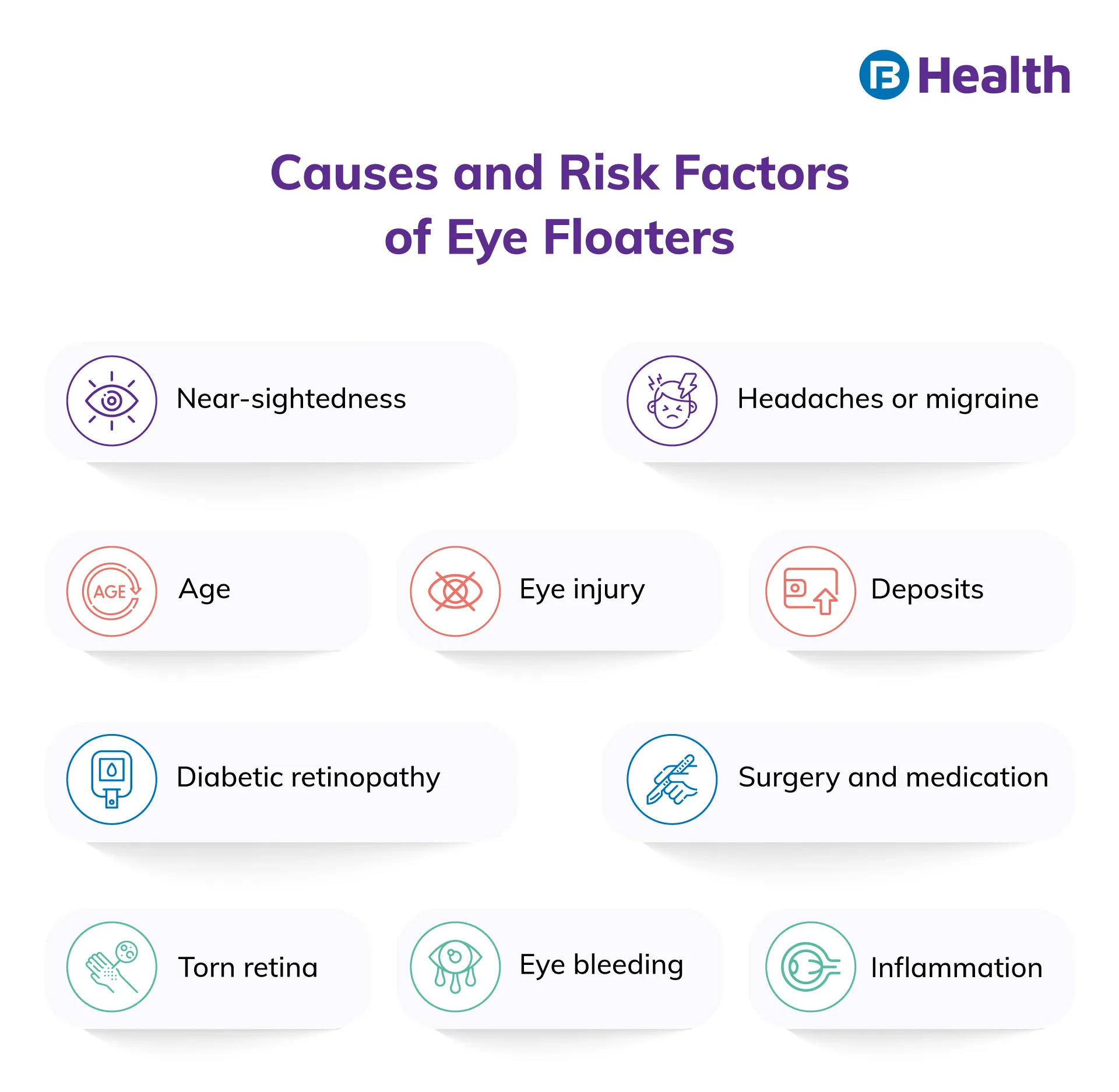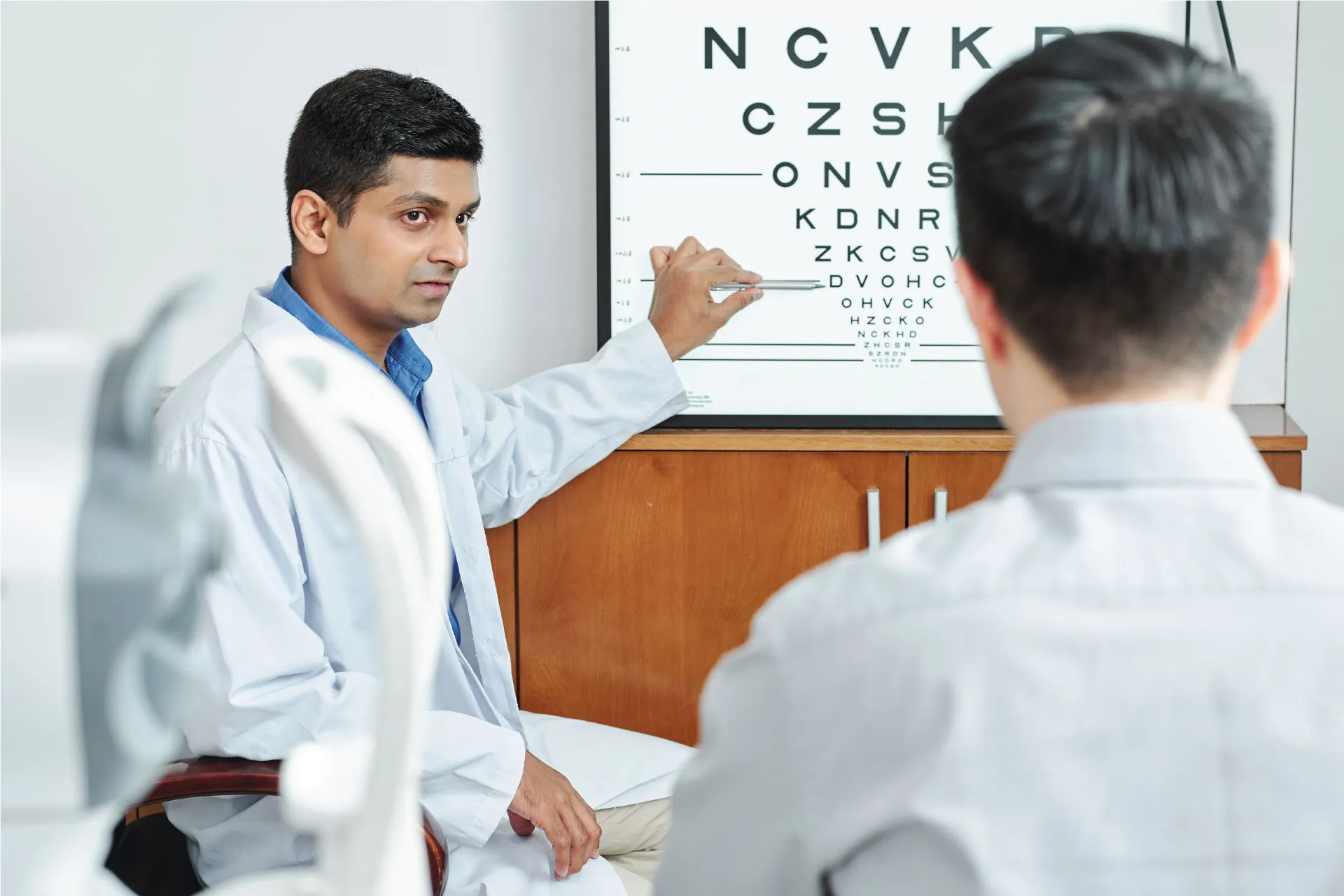Ophthalmologist | 7 min read
Eye Floaters: Symptoms, Causes, Types and Prevention
Medically reviewed by
Table of Content
Synopsis
Eye floaters appear in different shapes and forms in your field of vision. Although they are not a cause for concern, immediate attention is required when it starts to affect your sight.
Key Takeaways
- Age is one of the primary causes of eye floaters, among many other risk factors
- Types of eye floaters are Cobweb, Diffuse, and Weiss ring
- Eye floaters treatment includes laser removal and surgery
What are Eye Floaters?
Eye floaters are strings, web-like lines, or specks that appear in your field of vision. You will notice them move and drift away from your eyes if you look at them. Eye floaters are, in fact, inside the fluid of your eyes, which allows them to move as you move your eyes. They are usually black or gray and appear like it is outside of your eyes. There are different types of eye floaters based on their shapes and appearances. They are not known to cause discomfort or pain, but they may be a nuisance for some. They may also appear in one or both eyes. It appears when you stare at something bright for a long time, like a plain surface, blank paper, sky, or a reflective object. They are very common, and usually, it does not raise any cause for concern. However, they may be a symptom of an underlying disease or a developing eye condition.
Types of Eye Floaters
- Fibrous strand floater / Cobweb
- Cloud-like, diffuse floater
- Weiss ring floater
Eye Floaters Causes and Risk Factors
The most common causes of eye floaters are age and age-related changes. The cornea and lens are responsible for the eyes to focus light onto the retina. Light passes through a jelly-like substance inside your eyeball from the front end to the back end of your eye. This substance is called the vitreous humor.
It occur when changes happen to the vitreous humor. It is common as you age and is called vitreous syneresis. The substance will start to liquefy with age, making debris and deposits to accommodate the inside of your eyeball. This microscopic content inside will become a cluster, which gets caught in the path of the light. It blocks your retina and makes shadows, which causes eye floaters.

- Age
- Injury to the eye
- Near-sightedness
- Headaches or migraine
- Inflammation
- Eye bleeding
- Diabetic retinopathy
- Torn retina
- Deposits
- Surgery and medication
Retinal migraine and tumors may also cause eye floaters. If you notice an increase in eye floaters, consult a doctor immediately, as it may be a symptom of an underlying eye disease that can quickly become a threat to your vision. Eye floaters are more common at age 50 or above. [1]
Additional Read: Nearsightedness (Myopia): Causes, DiagnoseEye Floaters Symptoms
- Shapes that are transparent, gray specks, and strings of floating material will start to appear in your vision.
- They move as you move your eyes, and if you look at them directly, they will move away from your field of vision.
- These spots will become visible, especially when you stare at a plain bright background like a white wall or a blue sky.
- Small strings will eventually drift away from the line of your vision.
When to See a Doctor?
You should immediately contact an ophthalmologist under the following circumstances:
- If there is an increase in eye floaters.
- The sudden arrival of new and differently shaped floaters.
- If you experience flashes of light in the eye, that has the floaters.
- If there is a vignette or darkness on the sides of your vision, it is a condition associated with peripheral vision loss.
These symptoms are painless, a retinal tear is usually the cause, and it can happen with or without a retinal detachment. Immediate medical attention is required since it is a sight-threatening condition.

Eye Floaters Treatment
It usually are not a cause for concern, and eye floaters treatment can be unnecessary. They do not always act as a precursor for a pressing issue. Roll your eyes up and down and side to side to move the eye floaters obstructing your vision. The fluid in your eye is responsible for the eye floaters to drift inside your eye. Having said that, your vision can get impaired due to the floaters, especially when there is an underlying eye condition. It will come to a point when the floaters start to block your vision. In this case, eye floaters treatment includes laser removal and surgery.
Risks like retinal damage can happen in laser removal as it is experimental. An ophthalmologist uses a laser to disintegrate the eye floaters to make them less noticeable. Surgery is the other treatment option. The vitreous humor gets removed using a procedure called vitrectomy. With the substance removed, the space gets replaced with a sterile salt solution. The natural shape of the eye is intact with that substance. Natural fluid replaces it within a given time.
A vitrectomy does not guarantee that new eye floaters won’t develop as it cannot remove the entirety of the eye floaters in the first place. This type of eye floaters treatment procedure is risky as well and can cause tears to the retina, damage, and bleeding.
Additional Read: Yoga Exercises for Vision Improvement
Prevention of Eye Floaters
As you naturally age, you will tend to see eye floaters more. You can make certain that eye floaters are not a result of a much bigger problem, even though you cannot prevent them. It is important to see your ophthalmologist or optometrist as soon as you start to notice an increase in eye floaters. The doctors will make sure the floaters are not a symptom of a health condition that can threaten your vision.
Some Tips for Eye Health
Not all eye diseases need medical attention. Follow these general tips to guard your vision while maintaining a healthy eye.
Get a comprehensive eye examination
Some people wait until they see an issue with their vision to get an examination. Whatever may be the case, you need to see an ophthalmologist, eye doctor, or optometrist every two years to keep a healthy eye. If you are 65 years of age or older, it is even more vital. An eye screening is recommended at an earlier age if you have risk factors like eye disease, diabetes, or high blood pressure.
Follow a healthy diet
A healthy diet can go a long way. Maintaining a healthy diet is essential for the health of your eyes. Lutein and Omega-3 fatty acids are nutrients present in protein-rich foods and vegetables, which help prevent vision loss. Incorporate green vegetables, citrus fruits, and salmon into your diet as they not only help with the improvement of your vision but also reduce the risk of getting vision disorders.
Drink water frequently
Water is not just to be hydrated; it is an essential factor in human health. Harmful toxins and debris are flushed out of your body if you frequently drink water. Toxin buildup can produce eye floaters. Intaking water regularly helps your body feel refreshed and helps in the improvement of your eye health.
Wear protective eyewear
Get protective eyewear to guard your eyes against injury, especially if you are physically active or into sports. Wearing safety glasses during gardening, home repair, or doing household duties can protect your eyes from harm and reduce the risk of getting dirt or debris into your eyes.
Give rest to your eyes
Whether you are spending some time looking at your phone or in front of your computer screen, you should always wear blue screen filtering glasses. Consider the 20-20-20 rule while working on your PC. For every 20 minutes, look away and see something at a 20 feet distance for 20 seconds. Give your eyes a break often to maintain eye health.
Additional Read: 10 Tips for Healthy AgingIt can be annoying, but they often clear away from your vision on their own. You should also consider seeing an ophthalmologist immediately, just in case. Underlying eye conditions do not go away on their own. If eye floaters start to block your line of sight, know that there are treatments available to clear them up. Discuss the options with your doctor and your close ones before the treatment to prevent damage to your eyes.
You can do several yogas for the eyes, and asanas help improve your vision while keeping your eyes healthy. There are several beneficial yogas for the eyes, such as Halasana, Bal Bakasana, Ustrasana, Pranayama techniques, and Tratak meditation. [2] You can read about eye-related diseases like thyroid eye disease to know more. The health library on the Bajaj Finserv Health website has innumerable articles that focus on health, like red eye causes and treatment, for example. Promptly seeking treatment can save your eyesight. Get a doctor consultation with a few clicks on Bajaj Finserv Health app for an online appointment.
References
- https://newsnetwork.mayoclinic.org/discussion/mayo-clinic-q-and-a-what-are-eye-floaters/
- https://www.india.com/lifestyle/yoga-for-eyes-can-these-5-powerful-yoga-asanas-improve-your-eyesight-naturally-find-out-5053971/
Disclaimer
Please note that this article is solely meant for informational purposes and Bajaj Finserv Health Limited (“BFHL”) does not shoulder any responsibility of the views/advice/information expressed/given by the writer/reviewer/originator. This article should not be considered as a substitute for any medical advice, diagnosis or treatment. Always consult with your trusted physician/qualified healthcare professional to evaluate your medical condition. The above article has been reviewed by a qualified doctor and BFHL is not responsible for any damages for any information or services provided by any third party.





